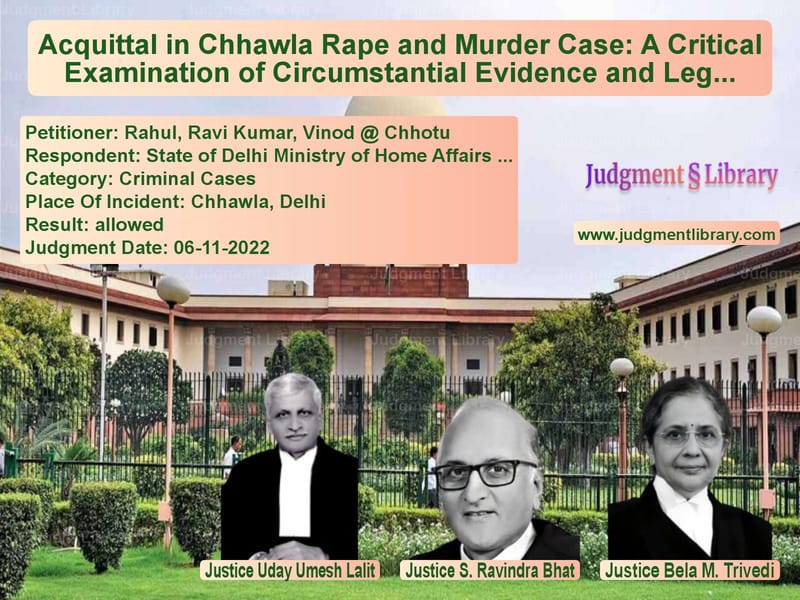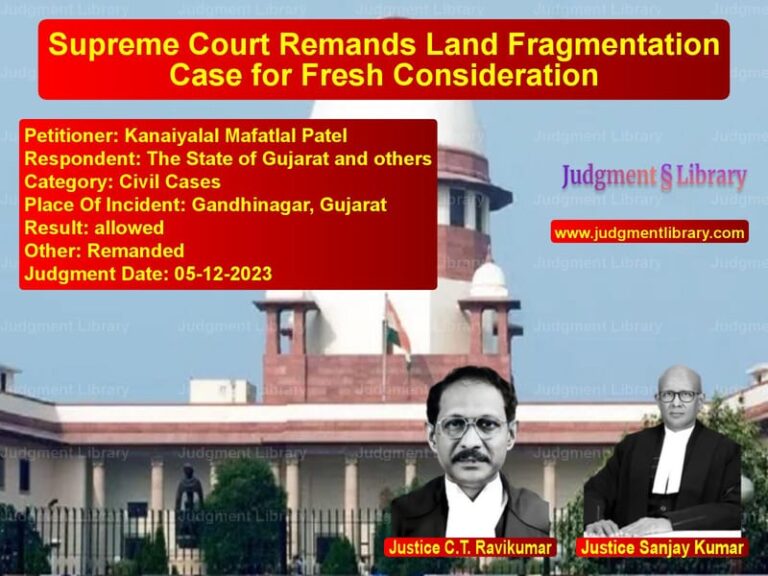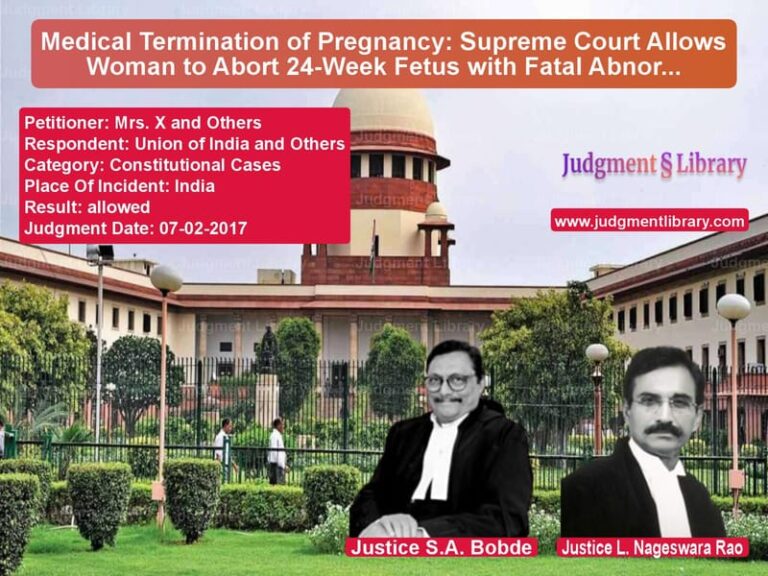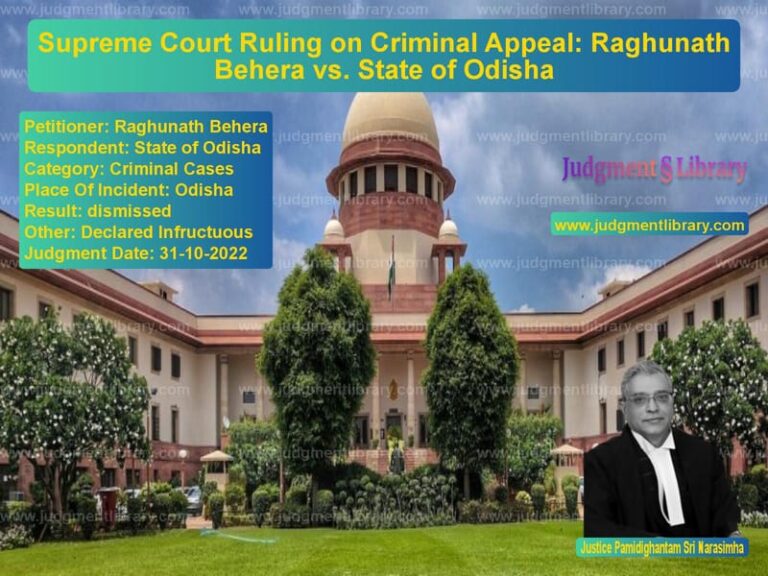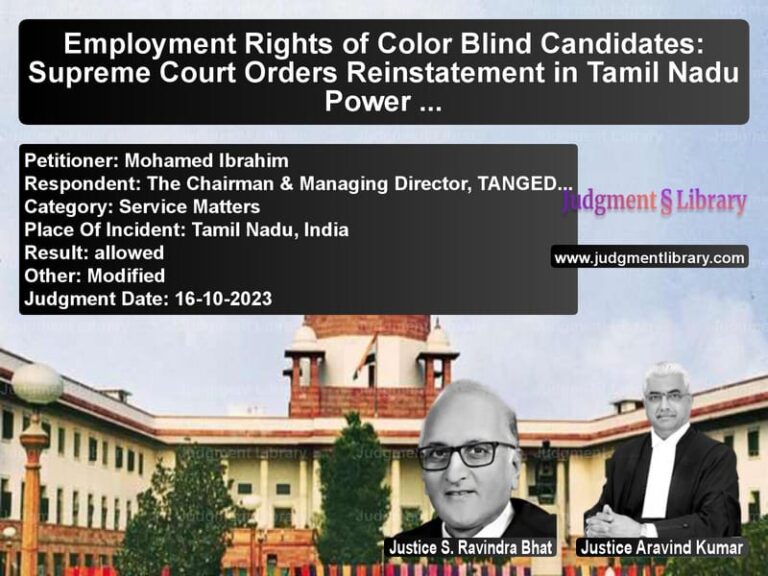Acquittal in Chhawla Rape and Murder Case: A Critical Examination of Circumstantial Evidence and Legal Gaps
The case of Rahul & Others vs. State of Delhi Ministry of Home Affairs & Anr. is a landmark judgment that highlights the complexities of circumstantial evidence in criminal trials. The Supreme Court of India overturned the conviction and death sentence of the accused in the Chhawla rape and murder case, citing serious lapses in the prosecution’s case and a failure to prove guilt beyond a reasonable doubt.
Background of the Case
On the night of February 9, 2012, a young woman was abducted in a red-colored Tata Indica car near Hanuman Chowk, Chhawla, Delhi. The next day, her mutilated body was discovered in a field in Haryana. The case sparked outrage due to the brutality involved. Three accused—Rahul, Ravi Kumar, and Vinod alias Chhotu—were arrested and later convicted by the trial court and the Delhi High Court, which sentenced them to death.
Key Legal Issues
The case revolved around the following legal questions:
- Was the prosecution able to establish the identity of the accused beyond reasonable doubt?
- Were the circumstantial evidences presented in court sufficient to prove guilt?
- Were the rights of the accused violated due to lapses in the investigation?
- Was the DNA and forensic evidence collected properly and legally admissible?
Key Arguments
Petitioners’ Argument (Accused)
The defense argued that the prosecution failed to establish the identity of the accused or prove their involvement beyond reasonable doubt. Their key contentions were:
- The accused were arrested based on a disclosure statement, which is inadmissible as evidence under the law.
- The prosecution failed to conduct a Test Identification Parade (TIP) to confirm the accused’s identity.
- The forensic evidence, including DNA profiling and mobile phone location records, was unreliable and not conclusively linked to the accused.
- The alleged recovery of a wallet, hair strands, and other items was not corroborated by independent witnesses.
- There were serious lapses in the investigation, including missing CCTV footage and inconsistencies in police statements.
Respondent’s Argument (State)
The prosecution argued that the conviction should be upheld based on the following points:
- There was a chain of circumstantial evidence linking the accused to the crime.
- DNA evidence from the accused matched samples taken from the crime scene.
- Mobile phone records placed the accused near the location of the crime at the relevant time.
- The accused had made extra-judicial confessions, which were corroborated by other evidence.
Supreme Court’s Ruling
The Supreme Court overturned the conviction, citing multiple lapses in the prosecution’s case. The judgment stated:
“The prosecution has failed to prove the guilt of the accused beyond reasonable doubt. The evidence relied upon is not conclusive, and the circumstantial evidence does not form a complete chain leading to the guilt of the accused.”
The Court pointed out the following flaws:
- Failure to Establish Identity: None of the eyewitnesses identified the accused in court.
- Unreliable Forensic Evidence: The DNA evidence and other forensic findings were not adequately corroborated.
- Questionable Arrest Procedures: The accused were arrested based on a disclosure statement, which is inadmissible unless supported by independent evidence.
- No Proper Investigation: The police failed to secure CCTV footage or conduct a proper search of the crime scene.
- Incomplete Chain of Circumstances: The circumstantial evidence presented did not conclusively establish guilt.
Impact of the Judgment
The acquittal in this case has significant legal implications:
- It reinforces the principle that conviction must be based on solid evidence, not just circumstantial inferences.
- It highlights the need for better forensic practices and stricter adherence to procedural laws in criminal investigations.
- It raises concerns about the role of the police in handling sensitive cases and the potential for wrongful convictions.
Conclusion
The Supreme Court’s ruling in this case underscores the importance of proving guilt beyond a reasonable doubt. While the crime was undoubtedly heinous, the failure to establish a watertight case against the accused led to their acquittal. This case serves as a reminder that justice must be based on strong, credible evidence rather than public sentiment or moral outrage.
Petitioner Name: Rahul, Ravi Kumar, Vinod @ Chhotu.Respondent Name: State of Delhi Ministry of Home Affairs & Anr..Judgment By: Justice Uday Umesh Lalit, Justice S. Ravindra Bhat, Justice Bela M. Trivedi.Place Of Incident: Chhawla, Delhi.Judgment Date: 06-11-2022.
Don’t miss out on the full details! Download the complete judgment in PDF format below and gain valuable insights instantly!
Download Judgment: rahul,-ravi-kumar,-v-vs-state-of-delhi-minis-supreme-court-of-india-judgment-dated-06-11-2022.pdf
Directly Download Judgment: Directly download this Judgment
See all petitions in Murder Cases
See all petitions in Rape Cases
See all petitions in Custodial Deaths and Police Misconduct
See all petitions in Legal Malpractice
See all petitions in Judgment by Uday Umesh Lalit
See all petitions in Judgment by S Ravindra Bhat
See all petitions in Judgment by Bela M. Trivedi
See all petitions in allowed
See all petitions in supreme court of India judgments November 2022
See all petitions in 2022 judgments
See all posts in Criminal Cases Category
See all allowed petitions in Criminal Cases Category
See all Dismissed petitions in Criminal Cases Category
See all partially allowed petitions in Criminal Cases Category

